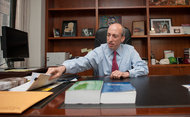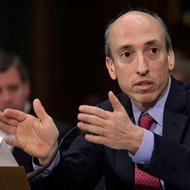 Peter W. Stevenson for The New York TimesGary Gensler, chairman of the Commodity Futures Trading Commission, voted in favor of the new overhaul of the derivatives market.
Peter W. Stevenson for The New York TimesGary Gensler, chairman of the Commodity Futures Trading Commission, voted in favor of the new overhaul of the derivatives market.
Federal regulators approved new rules on Thursday to shine a light on Wall Street trading, but they also softened a crucial aspect of the plan in the face of lobbying pressure from the nation’s biggest banks.
In a long-awaited vote to tackle an essential cause of the 2008 financial crisis, the Commodity Futures Trading Commission voted to adopt an overhaul of the derivatives market, pushing the risky trading from the shadows of Wall Street into the light of trading platforms. For decades, such trading has eluded regulators and the public.
“This is a paradigm shift for the American markets,” Gary Gensler, the chairman of the commission, said at the meeting. “When light shines on a market, the economy and public benefit.”
Yet, in the fine print, the agency also effectively empowered a handful of select banks to continue controlling the $700 trillion derivatives market.
Just five banks hold more than 90 percent of all derivatives contracts, which allow companies to either speculate in the markets or protect against risk. This tight grip came under fire amid concerns that those banks overcharge some companies for derivatives and pose a systemic risk to the economy. Derivatives, for example, pushed the insurer American International Group to the brink of collapse before it was rescued by the government.
In the wake of the crisis, the commission initially planned to require hedge funds, asset managers and other corporations to contact at least five banks when seeking a price for a derivatives contract. The proposed requirement was intended to bolster competition among the banks.
Under pressure from the banks — and some firms that buy derivatives — the agency agreed to lower the requirement to two banks. In about 15 months, the standard will automatically rise to three banks, but the agency agreed to produce a study that could undermine that broader standard.
The move was the product of a compromise among the agency’s five commissioners, who voted 4 to 1 in favor of the plan. Mr. Gensler, a Democrat, pushed for the higher standard. So did Bart Chilton, a fellow Democrat and frequent critic of financial risk-taking. But their plan met opposition from the Republican commissioners, and from Mark P. Wetjen, a Democrat who has sided with Wall Street on other rules.
Mr. Wetjen argued that five price quotes was an arbitrary number. He pushed for the two-bank plan, arguably the minimum required under Dodd-Frank Act of 2010, the law that mandated an overhaul of derivatives.
Even that compromise failed to please Wall Street. The Securities Industry and Financial Markets Association, the industry’s main lobbying group, said in a statement that the rules “impair market liquidity at the expense of all market participants.”
But consumer advocates, and even some regulators, have questioned whether the agency ceded too much ground. In the futures market, regulators note, a request for a price quote must be broadcast to the entire market.
“I’ve never been a more reluctant and reticent regulator than today on these rules,” Mr. Chilton said at the meeting. “I just wish we had reached a different compromise.”
Mr. Chilton joined Mr. Gensler in supporting the measure. Mr. Wetjen, who said that the more flexible plan “is not code for status quo as some might suggest,” also voted for the plan.
Jill E. Sommers, a Republican commissioner, cast the lone vote against the proposal.
In some ways, the compromise overshadowed the broader magnitude of the agency’s effort.
Under the adopted plan, many types of derivatives that have traded exclusively in private must now shift to a regulated trading platform. The platforms, known as swap execution facilities, will open a rare window into the secretive world of derivatives trading and serve as a check on risky activity.
In another rule, adopted in a 3-to-2 vote on Thursday, the agency required that large swaths of derivatives trades enter a swap execution facility. The rule captured more derivatives than the financial industry had hoped.
“No longer will this be a closed door market,” Mr. Gensler said.
Mr. Chilton was not satisfied. Before casting his vote for the plan, he said, “I’m still holding my nose and biting my tongue.”
A version of this article appeared in print on 05/17/2013, on page B8 of the NewYork edition with the headline: Regulators Tighten Rules On Trading of Derivatives.
Article source: http://dealbook.nytimes.com/2013/05/16/regulators-overhaul-derivatives-market-but-with-a-caveat/?partner=rss&emc=rss


